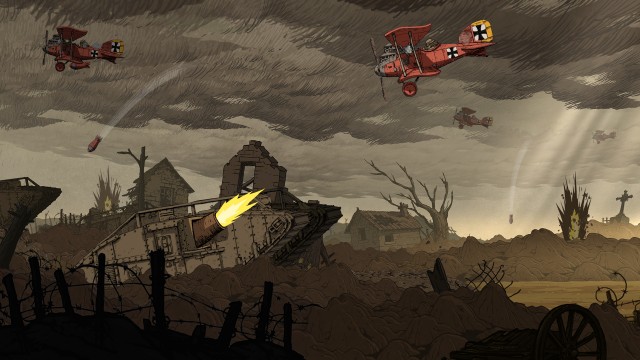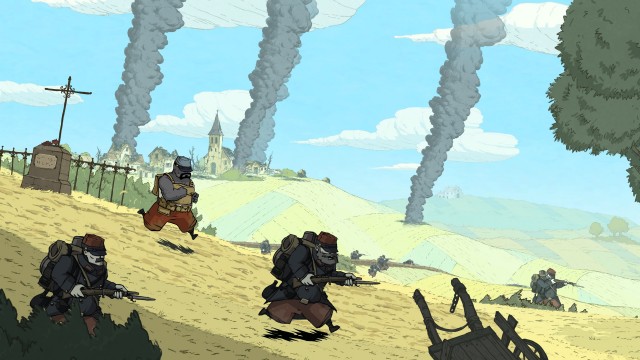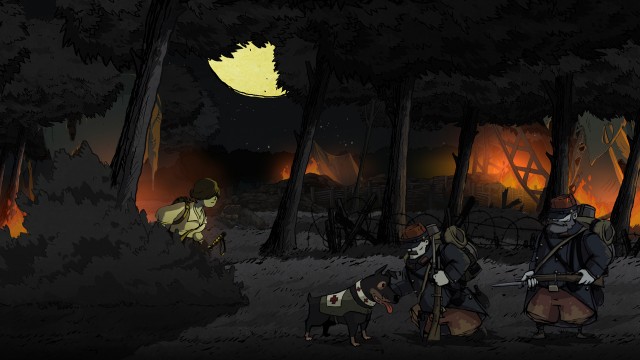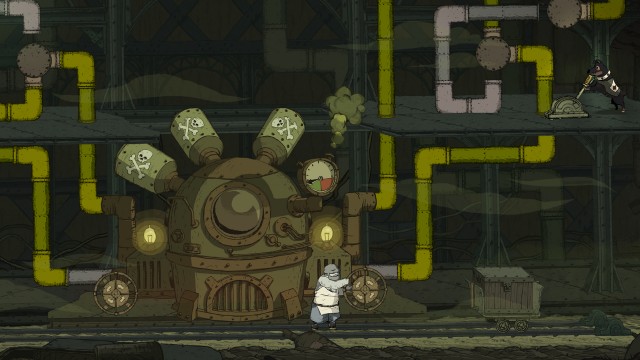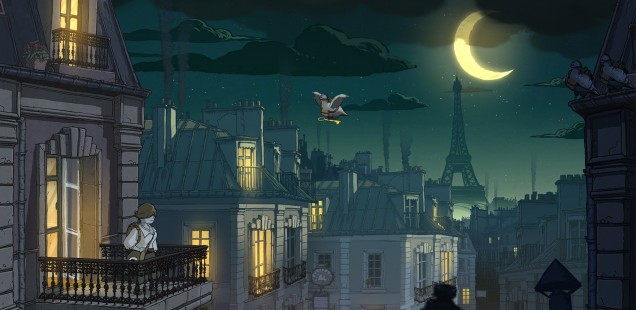
Due Diligence: The Beautiful Boredom of Valiant Hearts
Leigh Harrison considers the brave boredom of war in Valiant Hearts
Time’s a funny thing, isn’t it? We often spend it with the best of intentions, yet eventually realize we’ve wholly wasted it. I personally spend a lot of mine thinking and talking about things that disappoint or upset me. It’s a personality trait that infects my entire life; I have a lot of time for the bad, yet for some reason I fail to equally acknowledge the good. This is probably because, in general, my life is pretty blessed. I I’ve become rather accustomed to living happily, and as a result, goodness is default whereas badness is visible. That being said, it’s foolish to not cherish what you have, so I’m going to force myself to speak emphatically about something super, super good.
When I was younger and first getting myself into horror films, I often wondered why the characters were usually so underdeveloped. They largely adhere to silly, American stereotypes: the jock; the stoner; the smart girl; the spoilt, bratty only child; the dark, slightly older loner; the biker; the cheerleader. As a British adolescent most of these archetypes were unfamiliar, but I still managed to find my own approximations of them. This projected familiarity, however, didn’t make them any less two-dimensional as characters. They are there to die, yes, but wouldn’t their deaths be that much more meaningful if we actually liked them – if we actually knew them? So, in my innocence, I decided that the best way to remedy this problem would be to make two films. One would be a straight-up drama or romantic comedy, and this would set the stage and develop the characters. There would be no horror whatsoever; because this film would be about making audiences connect with the characters. The second part would be the horrific crescendo, where everyone you loved would be cut down with typical genre picture vigor. Only this time, you might actually care – because it was Ferris Beuller getting chopped up with a lawnmower. I still think there’s massive potential in the concept: bad things happen to everyone, but we care so much more when we’re involved with them.
It is for this very reason that Valiant Hearts succeeds in telling its story. At heart, it is a deeply mundane, sometimes infuriatingly designed adventure game. In practice, however, and as long as you stay its course, it is a heartbreakingly human tale of horror far beyond the likes of Friday the 13th or – why not? – Urban Legend. It seeks to tell stories about the First World War in much the same way the early Call of Duty games told stories about the Second. To this end, in Valiant Hearts, you play as four different characters, all essentially civilians drawn into the conflict – that is, not professional soldiers to begin with. It is through their eyes that we see the interconnected mess the war has wrought on the citizens of Europe.
Before we continue, I’d just like to point out that I’ll be discussing the finer points of Valiant Hearts’ narrative. Pretty much all of them, actually.
We’re first introduced to Karl and Marie, a married couple, their son Victor, and Marie’s father, Emile. They all live together on a farm in north-eastern France, in what can only be described as an idyllic fashion. It is 1914, Archduke Franz Ferdinand of Austria has just been assassinated, and, through a complex system of alliances, Europe’s major powers are now all at war. As a consequence, all German nationals are to be ejected from France. Thus, both Karl and Emile, despite his advanced middle age, are forced to join the army: Karl into the German army and Emile into the French army. They are the first, though certainly not the only, family to be torn asunder by the war.
The rest of the cast is filled out by Anna, a Belgian nurse, and Freddie, an American expat volunteering in the French army. Both are tracking Karl’s superior officer, Baron Von Dorf, an aloof and high-ranking German obsessed with military prestige. He has kidnapped Anna’s father, an eminent scientist, and is using his knowledge to develop chemical weapons. Freddie too has good reason to seek the Baron: his wife was killed during a German attack Von Dorf personally led, and Freddie wants to bring him to justice. Each of these characters has been deeply affected by the war, but their grievances are never portrayed as merely selfish acts of score-settling – even Freddie’s, whose quest is to apprehend not to kill, the Baron. All of their families have been destroyed in some way, and they are using their forced presence in the war to, hopefully, help prevent the same happening to others. Valiant Hearts has no interest in glorifying war, but it does seek to highlight the brave and selfless actions of those sucked into it.
Most of the game’s narrative is framed by the unrelenting search for Von Dorf. He personifies the senselessness of the war and the political posturing which led to it, but – and the game goes to great pains to say this – he is in no way representative of the German people on the whole. He is merely a plot device to neatly cut a path through, what would otherwise be, a quagmire of a subject. By utilizing him in such a way, the game smartly gives players something constant to aim for while it tells its real story: that of the Great War on the whole. Indeed, initially, the characters’ constant march after Von Dorf seems to be a triumphant and conventional journey toward good overcoming evil, but it later becomes clear that, while they may all have an ultimate goal, the war is in control and will pull them where it chooses.
Emile, for example, starts off fighting alongside the French army, but is quickly injured and taken prisoner by the Germans. His captors are then, themselves, attacked, and in the confusion he manages to escape the immediate danger, only to be sent back to fight in numerous bloody battles at the whim of his superiors. The hopelessness of his situation is, in my mind, symbolized by his trusty ladle. Emile is not a soldier, he is a farmer dragged into a conflict he wants no part of. He isn’t equipped to be a soldier, either literally or figuratively, and spends much of the game completely unarmed. Except for his ladle. This means that your time spent with him is largely concerned with running about and avoiding conflict entirely. He befriends a German army dog named Walt, and together the two sneak around battlefields trying to stay alive. Neither of them is in control of their destinies – the war and Emile’s officers have seen to that – so they are simply left to make the best of their situation.
Karl, Anna, and Freddie are all in similar positions of powerlessness. Karl and Freddie have clear obligations to their respective armies, but Anna is a much more interesting character. She is bound just as much to duty as her male counterparts, but hers is a self-imposed sacrifice. Initially working alone, and then with Karl, she travels tirelessly across western Europe plying her medical training. Her true goal may be to secure her father, but she never hesitates to help those in need if she happens upon them, whether they be from the ‘good’ or ‘bad’ side of the conflict. Oftentimes this will place her in direct danger, but it matters to her not: she won’t leave injured people suffering if they can be helped.
The sense that everyone is in the same dire situation permeates deeper than merely playing on both sides of the conflict as Emile/Freddie/Anna and Karl. It’s present in all parts of the game. From German soldiers overheard talking fearfully of a tyrannical officer and his lack of sausages, to Canadian soldiers cowering in shell craters, and prisoners of war from both sides eking out uncertain existences: everyone is suffering. Everyone is humanized.
The most memorable example of this occurs when Emile is ensconced under Hill 60. He is tasked with helping sappers tunnel further into the hill, while the Germans do exactly the same a few feet away. The game’s painterly 2D art allows us to see both armies as they dig, creating images that bypass all concepts of allegiance and show the two groups of engineers to be wholly the same. Emile momentarily befriends a German soldier as they explore this subterranean landscape, and together they work to traverse a large chasm that would be otherwise impassable were they alone. This, of course, is designed to further highlight the arbitrariness of defined sides within conflict. The game is unselfconsciously making us aware that it wholeheartedly believes in its humanitarian narrative. Later in the level, this intent comes to fruition when Emile encounters a small group of enemy soldiers. Faced with certain death, his life is only just saved in the nick of time when his German friend reappears and recounts their mutually beneficial chasm-hopping antics to his compatriots. Shortly after – the bitter sting that always follows Valiant Hearts‘ uplifting moments – allied engineers detonate explosives beneath an enemy tunnel, killing all of Emile’s saviors.
Valiant Hearts is a miserable experience to put one’s self through. Good people die at every turn. Hardship is inflicted upon everyone you meet. Every single person, the game impresses, has suffered in some unknowably terrible fashion. But this is one of the game’s greatest strengths. The First World War occurred on a scale never before seen, and the game successfully captures its terrible might. The family farm our heroes were cruelly ripped from at its opening may have seemed a million miles away from the blood and death and misery of the battlefield, but when we return to it, we see the true scope of the war.
Late in the game – and after surviving a zeppelin crash, escaping a prisoner of war camp, taking part in numerous battles and trudging, half-dead across most of the Western Front – Karl finally arrives home. His once picturesque homestead is now a wreck, buckling under the pressures of warfare. Its roofs have collapsed, doors have fallen from their thresholds and Marie and Victor are nowhere to be seen. What follows is a little microcosm of what actually playing Valiant Hearts is like. As you move through the farm buildings your progress is constantly halted by environmental barriers. You’ll pull levers, turn switches, climb ladders, direct a canine companion to areas Karl can’t reach, smash debris blocking your path, and throw useful items across holes in the floor. It is, if I’m being honest, really rather drab and formulaic. What you are being asked to do isn’t mentally challenging. Oftentimes, you’ll fall into the adventure game malaise of knowing exactly how to solve a problem and then simply have to figure out how the game chooses you accomplish it. This regularly leads to a fair bit of anachronistic to-ing and fro-ing, backtracking yourself about while you discover how to open a door or hoist a flag. It all kind of feels out of place amid the urgency of a great big war.
On the other hand, though, Valiant Hearts being really mundane to play actually works to its advantage. In his wonderfully exhaustive video critique of the Call of Duty series, Noah Caldwell-Gervais quotes Vietnam veteran and author Tim O’Brien discussing his time at war. “If you weren’t humping, you were waiting. I remember the monotony. Digging foxholes. Slapping mosquitoes. The sun and heat and endless paddies. Even deep in the bush, where you could die any number of ways, the war was nakedly and aggressively boring.” This quote exemplifies the experiential tone of playing Valiant Hearts. It is just so, so boring. Crucially, though, the game’s boredom is tinged with all sorts of other things. Fear. Paranoia. Anxiety. Loneliness. The game is filled with what Caldwell-Gervais perfectly calls “malevolent boredom”. And this – this is really why Valiant Hearts works so well.
It’s a long game. Well, it isn’t actually – I think it’s about six hours or so – but it feels as though it takes an eternity to get through. That’s because, as I’ve said, you’re mostly trudging about and going up and down (and up and down) ladders. There are a few scattered instances of combat, but these themselves largely involve you pulling levers and switches in order to operate a large piece of war machinery. There are a couple of times when you’re called upon to bonk a soldier on the head with a shovel or – yes – a ladle, but that really is as exciting as things ever become. Just like its humanitarian narrative, Valiant Hearts staunchly upholds its dismal view of the Great War on the whole, going as far as to make itself exhaustingly mundane to project this. In doing so, our attention as players is drawn away from the macro, the war in general, and is focused instead on the tiny, moment-to-moment events taking place within it. In this way, we are invariably drawn towards – into, even – the characters we control. In removing the typical bombast and chest-beating associated with most videogame depictions of warfare, in removing almost all of the death-dealing we’re used to partaking in, Valiant Hearts leaves us with very little to hold on to except its characters. It’s a strikingly brave move when you think about it.
In one of the game’s last sequences, Emile is ordered to fight in the Nivelle Offensive; a bloody, almost suicidal march straight into German lines. French officers here are forcing their men to run headlong at the enemy, often resulting in them being instantly cut down.. This is depicted, through the game’s mechanical lens, as a cruel twist on those Super Mario Bros. levels where you can’t stop moving. Instead of the screen following you, however, here it is a gruff French commander brandishing a pistol and sabre. If Emile lingers for too long or runs back to the left, he’s just cut down by his own superior. After enduring this treatment, and seeing many of his contemporaries forced to run right into a hail of bullets, Emile takes a stand. He smacks his commanding officer up the side of the head with a shovel, accidentally killing him. Shortly after, he is court martialed and sentenced to death, ironically, by firing squad.
The final scene of the game sees Emile walking towards his fate, chaperoned by yet another superior officer – though for once this chap is leading from the front. As they pass groups of soldiers they are saluted. It is ambiguous as to whom this reverence is directed towards, but one can imagine Emile, with all he’s done over the course of the war and his current predicament, is the intended recipient. As the officer falls back, Emile is left to walk silently towards his executioners. Freddie is there in person, accompanied by the fading images of Walt, Karl and finally Marie and Victor. We hear Emile reading aloud from a letter he has just sent his daughter, as if his words were spoken directly to these wispy memories. “As the war ends for me I have no regrets, I’ve seen too much horror. I hope fate has been more merciful to you. This letter is my last, I’ve been found guilty by a military court for the death of an officer. It was not my intention to kill him. War makes men mad.” The screen cuts to black as shots pierce the silence. I have a little cry.
The ending of Valiant Hearts is wonderfully impactful. In showing me the torment and anguish and boredom and discomfort associated with being a part of – not even really fighting in – a war, the game drives me into the arms of its characters. I repeatedly clipped through barbed wire fences with Freddie. I dug countless tunnels with Emile. I played far too many rhythm-healing mini games with Anna. I had to run around a concentration camp fixing leaky pipes with Karl. I can’t help but fall in love with all four of them, because together we’ve dragged ourselves through such meaningless, skull-crushingly boring activities. But what is the alternative when all around these contrived obstacles is death? War isn’t just about shooting bad people in the head for six hours. War is sometimes about pushing boxes and climbing up and down ladders instead. And while that handful of hours may appear to stretch out into eternity before you as you play, when they finally do end – when that old man with his ladle finally walks his last – those hours of apparently doing nothing are brought into stark focus.
Heroes come in all shapes, sizes and – yes – genders, Valiant Hearts tells us. In stripping its activities back to mere busywork, the game shows us that almost anything and anyone can be considered heroic, given the right circumstances. It also gives us ample time to really develop an appreciation for this message, being, as it is, one long, unspectacular slog. In its own way, Valiant Hearts should be considered one of the most faithful videogame representations of war yet seen. It is boring, yes, but so is war – indeed, so too are most games about war. It shies away from bombast, frivolity and glorified, exciting violence, instead showing us compassion, meaningless death and genuine suffering everywhere. It gives its story and characters ample room and time to breathe, allowing them to eventually worm their way into, and then break our hearts. That it is all of these things should be commended. Valiant Hearts is a stunning achievement of interactive storytelling.
Leigh Harrison lives in London, makes DVDs for a living and owns a hamster. He likes canals and rivers a great deal, and spends a lot of his time walking. He occasionally says things about videogames on the Internet, and other things on The Twitter.
